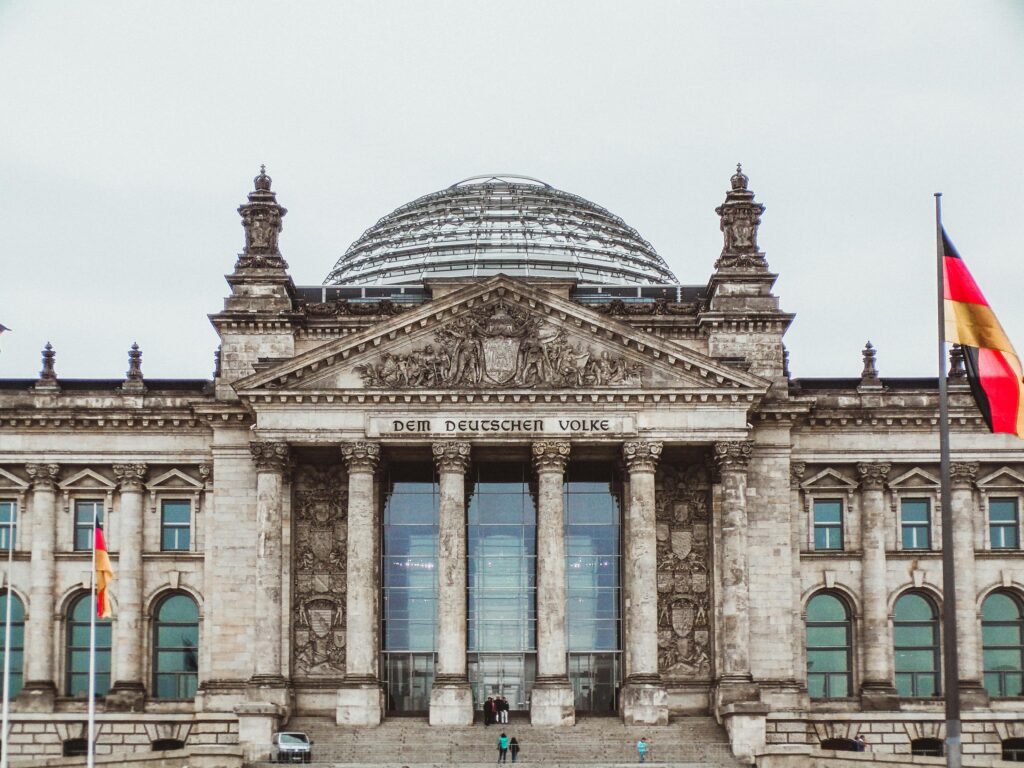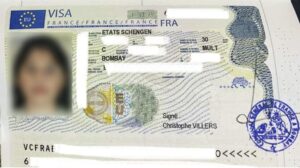Country Details
Germany
Germany: A Land of Rich Heritage and Modern Wonders
Germany is one of Europe’s most popular tourist destinations, offering a perfect blend of history, culture, and modern attractions.
Germany is home to some of the world’s most famous historical sites. The Brandenburg Gate in Berlin, a symbol of unity, and the Berlin Wall Memorial offer insights into the country’s past.

Why choose us?
Top Locations
Germany is a top travel destination known for its rich history, diverse landscapes, and modern attractions. From fairy-tale castles to vibrant cities and picturesque countryside, the country offers something for every traveler.

- Berlin
- Munich
- Cologne
- Hamburg
- Dresden
Germany Visa Information
Visa Type: Sticker
Length of Stay: 180 days
Validity: 10 Years
Entry: Multiple
General Information
Do Indian citizens need a visa for Germany?
Yes, Indian citizens planning to visit Germany must obtain a Schengen visa type C. This visa allows entry into Germany and other Schengen Area countries for short stays of up to 90 days within a 180-day period for tourism, business, family visits, or other approved activities.
How long is the German tourist visa valid?
The German tourist visa is valid for up to 180 days and allows a maximum stay of 90 days within this period. The visa’s validity allows you to enter Germany and other Schengen countries multiple times, provided you do not exceed the 90-day stay limit within a 180-day period.
What is the Germany visa fees for Indians?
The Germany visa fees for Indians are as follows:
€90 for adults (approximately ₹8,000).
€45 for children aged 6-12 (approximately ₹4,000).
No fee for children under 6.
How long does it take to process a German visa for Indians?
German visa processing typically takes 15 days but may extend during peak seasons. It is recommended that you apply at least 4-6 weeks before your planned travel date.
Can I travel to other Schengen countries with a German visa?
Yes, a German Schengen visa allows you to travel freely to the following 28 Schengen countries: Austria, Belgium, Bulgaria, Croatia, Czech Republic, Denmark, Estonia, Finland, France, Greece, Hungary, Iceland, Italy, Latvia, Liechtenstein, Lithuania, Luxembourg, Malta, Netherlands, Norway, Poland, Portugal, Romania, Slovakia, Slovenia, Spain, Sweden, and Switzerland.
However, your itinerary must clearly indicate your intention to visit these countries. Additionally, when applying for a German Schengen visa, ensure that Germany will be your main destination, meaning you will spend more time in Germany than in other Schengen states.
What is the minimum bank balance required for a Germany tourist visa?
While Germany does not have a fixed minimum bank balance requirement, you must demonstrate sufficient funds to cover your stay in the Schengen Area. A general guideline is to show a minimum balance of around €60-70 per day of stay, translating to approximately €1,800 to €2,100 for a 30-day stay.
Eligibility & Requirements
To apply for a German visa from India, you will need the following documents:
Valid passport: You will need to submit your passport, which should be valid for at least three months beyond your planned departure from Germany. It must have been issued within the last ten years and contain at least two blank pages.
Visa application form: A printed copy of the Germany visa application form filled out online.
Passport photos: Provide recent passport-sized photos that meet the specified German visa photo requirements.
Proof of professional status: Provide documents that verify your employment status, such as pay slips and employment letter (if employed) or business registration documents (if self-employed).
Proof of income: Submit bank account statements for the last three months and ITR acknowledgement for the last three years. The bank statements should be signed and stamped by your bank.
Proof of accommodation: Show evidence of your accommodation arrangements in Germany, such as hotel bookings, rental agreements, or an invitation letter from a host.
Return flight ticket: A confirmed return or onward flight ticket that proves your plan to leave Germany before your visa expires.
Purpose of visit: Clearly state the purpose of your visit, whether it’s tourism, business, studies, or other activities, in your cover letter.
Previous travel history: If you have travelled to Schengen countries before, include previous visa copies or entry/exit stamps as proof of your travel history.
Travel insurance: Obtain Schengen travel health insurance with a minimum coverage of EUR 30,000 that covers medical emergencies, hospitalisation, and repatriation for your stay.
Yes, you can apply for a Germany visa without a confirmed flight booking. However, you will need to provide a flight itinerary or reservation as proof of your intended travel dates.
Note: Many visa agencies and airlines offer services where you can reserve a flight itinerary for visa purposes without purchasing the ticket. Consider using a refundable or reservable ticket option, which allows you to make changes or cancel the booking without financial loss if your travel plans change.
Yes, travel insurance is mandatory when applying for a Germany visa. Additionally, the travel insurance must meet the following criteria:
The minimum coverage shall be €30,000.00.
The insurance shall be valid throughout the territory of the Schengen States.
It should cover the entire period of the person’s intended stay or transit in the Schengen Area.
The travel insurance should cover any expenses that might arise in connection with repatriation for medical reasons, urgent medical attention, emergency hospital treatment, or death during the stay(s) on the territory of the Member States.
Note: Ensure the Schengen countries recognise your insurance provider. You can find a list of approved Indian travel insurance companies on the government website.
As a housewife with no independent income, you can still succeed in your German visa application by providing the following:
Sponsorship letter: Obtain a sponsorship letter from your spouse or a close family member who will sponsor your trip. The letter should clearly state the relationship between you and the sponsor and their commitment to covering your travel expenses.
Sponsor’s financial documents: Submit your sponsor’s bank statements, income tax returns, and salary slips as proof of financial support.
Proof of relationship: Depending on your relationship with the sponsor, include a copy of the document (like a marriage certificate) that establishes your relationship with your sponsor.
Proof of shared assets: If applicable, provide documents showing jointly owned property or bank accounts, which further prove your financial stability.
To demonstrate that you can support yourself financially during your stay in Germany, you will need to provide the following financial documents:
Bank statements: Submit original bank statements from the past 3 months. These statements should show regular income, such as salary credits, and maintain a healthy balance.
Income Tax Returns (ITR): To prove your financial stability, provide copies of your ITR filings for the past 3 years.
Salary slips: If you are employed, include your salary slips for the past three months.
Proof of investments: You can also submit documents showing other assets, such as fixed deposits, mutual funds, or property, as additional financial proof.
To reassure the consular officer that you will return to India after your trip, you need to demonstrate strong ties to your home country by providing the following documents:
Employment proof: Submit a letter from your employer that confirms your job position, salary, and approved leave. The letter should also state that your job will be available upon your return.
Property ownership: Provide documents that prove ownership of property or real estate in India, such as a house or land, to demonstrate a significant investment in your home country.
Family ties: To demonstrate your responsibilities in India, submit documents detailing your family situation, such as marriage certificates or birth certificates of dependent children. This is particularly important for unemployed individuals like housewives or retirees.
Educational commitments: If you are a student, include a letter from your educational institution confirming your enrollment and the date of your return to continue your studies.
Business ownership: If you own a business, provide documents such as business registration certificates, tax returns, and bank statements to show that you are responsible for running a business in India. This indicates that you need to return to manage your business operations.
Yes, a cover letter is usually required for a Schengen visa application. It should include the following:
Personal information: Your name, address, and passport number.
Purpose of visit: A detailed explanation of your visit (e.g., tourism, business, family visit).
Itinerary: A brief outline of your travel dates, accommodation, and the places you plan to visit.
Financial means: An explanation of how you’ll finance your trip, with supporting documents attached.
Intent to return: A statement explaining your ties to your home country, demonstrating that you intend to return after your trip.
For minors applying for a German visa, the following additional documentation is required:
Consent letter: A letter of consent from the non-travelling parent(s) or legal guardian certified by a public notary.
Passport copies: Copies of the passport, PAN card, or driving license of both parents or legal guardians.
Travel authorisation: A court order or written parental authorisation is necessary if the minor is travelling without both parents.
Proof of guardianship: If the minor is travelling with a third party, documentation proving the relationship and permission from the parents or guardians must be provided.
As a business owner, you can strengthen your German visa application by showcasing your financial stability and clearly defining the purpose of your travel. Here’s what you should submit:
Business financial statements: Provide recent financial statements of your business, such as profit and loss accounts, balance sheets, and bank statements covering at least the past three to six months.
Company registration documents: Provide copies of your business registration documents, including your GST certificate, company PAN card, and incorporation certificate.
Business tax returns: Include your business’s income tax returns for the past two years to demonstrate financial health and stability.
Invitation letter: If travelling for business purposes, attach an invitation letter from your German business partner or the organisation you will visit. The letter should clearly state the purpose and duration of your visit.
For a German visa, your passport photo must adhere to specific Germany visa photo requirements:
Size: 35 mm x 45 mm (width x height).
Head size: The head should occupy 70-80% of the photo, approximately 32-36 mm from chin to crown.
Colour: The photo must be in colour with a plain white or light grey background.
Face position: The applicant’s face must be centred and face the camera with a neutral expression.
Eyes: Eyes should be open and clearly visible, without any reflections or obstructions.
Glasses: If you wear glasses, ensure there is no glare or reflections on the lenses and your eyes are clearly visible. Avoid tinted glasses.
Headwear: Headwear is not permitted unless worn for religious reasons. In such cases, the face must be fully visible from the bottom of the chin to the top of the forehead, with the edges of the face visible.
Application Process
Indian citizens can apply for a German visa by following these steps:
Gather the documents: Gather all necessary documents, including your passport, photograph, and financial statements. Make sure everything is in order before proceeding.
Complete the application form: Complete the German visa application form online. Avoid mistakes or incomplete information, as they can lead to rejection, so take your time and review the form before submission.
Schedule an appointment: Book an appointment at your nearest visa application centre (VAC).
Attend your appointment: On the day of your appointment, arrive early and bring all required documents. You’ll submit your application, pay the fee and provide biometric data (if required).
Wait for visa processing: After submission, processing takes 15 to 30 days but may take longer during busy periods.
Collect your visa: Once your visa is approved, you will be notified via email, SMS, or your preferred contact method. You can then collect your passport with the visa sticker from the visa application centre.
No, an interview is not mandatory for Indians applying for a German tourist visa.
However, in special circumstances, such as when there are discrepancies in your application or if the visa officer deems it necessary for further assessment, an interview may be requested. This is generally to clarify details or gather more information to ensure the integrity and accuracy of your application.
To increase your chances of a successful German visa application from India, avoid these common pitfalls:
Lack of documents: Ensure you provide all required documents and that they all meet the requirements. This includes your passport, which must be valid for six months, and bank statements from the last three months, etc.
Insufficient financial proof: Demonstrate sufficient funds to cover your stay in Germany. Include stamped bank statements showing consistent financial stability.
Unrealistic itinerary: Submit an accurate travel itinerary that aligns with your stated purpose, including confirmed reservations and a clear travel plan.
Lack of travel insurance: Ensure your travel insurance provides comprehensive coverage, including medical emergencies and repatriation, meeting Germany’s Schengen visa requirements.
Unclear purpose of visit: Clearly state your purpose of visit, ensuring all details, like accommodations and activities, align with the reason for your stay in Germany.
After approval, your German visa will be placed on your passport. Here is a sample of how your visa will appear:

No, each family member must submit a separate Schengen visa application, including children and infants. Each applicant needs to meet the requirements and provide their own set of documents.
To obtain a long-term Schengen visa for Germany, especially under the new regulations favourable to Indian nationals, follow these steps:
Build a travel history: Secure and properly use two Schengen visas within the last three years.
Apply for multiple-entry: Once you’ve met the travel history requirement, apply for a multiple-entry visa. Initially, this visa may be valid for up to two years. Proper use of this visa can lead to eligibility for a five-year multiple-entry visa.
Check passport validity: Ensure your passport has enough validity to cover the entire duration of the multiple-entry visa you are applying for.
Provide justifications: Your application should clearly outline the need for multiple entries, such as frequent business travel, family visits, or other ongoing travel needs.
Utilise the cascade regime: Under the EU’s “cascade” regime, Indian nationals can progress from a two-year visa to a five-year visa, gaining travel privileges similar to visa-free nationals if all conditions are met.
Understand EU regulations: The Visa Code Regulation (EC) No 810/2009 governs Schengen visas. The new “cascade” system facilitates easier access to long-term visas for Indian nationals with an established travel record.
Entry & Exit Regulations
No, a German tourist visa does not permit you to work or study in Germany. It is issued only for short-term visits such as tourism, medical treatment, or family visits. If you wish to work or study, you must apply for the appropriate visa.
Yes, you can bring prescription medication into Germany on a Schengen visa, but you should carry a prescription or a doctor’s letter that includes:
Patient information: Your full name and the medication’s intended use.
Medication details: The name of the medication, dosage, and the prescribed amount.
Doctor’s information: The prescribing doctor’s name, address, and contact information.
Yes, you can bring your pet to Germany with a Schengen visa, but you must meet specific requirements:
Microchip: Your pet must be microchipped with an ISO 11784/11785 compliant 15-digit pet microchip.
Rabies vaccination: Your pet must be vaccinated against rabies at least 21 days before travel.
EU pet passport: If your pet travels from an EU country, it needs an EU pet passport. If travelling from outside the EU, a third-country official veterinary certificate is required.
Tapeworm treatment: Dogs must be treated for tapeworm 24-120 hours before entering Germany.
Visa Extension & Overstays
If you need to extend your stay in Germany for medical reasons, you can apply for a visa extension at the local immigration office. To do this, you will need to provide:
Medical certificate: A certificate from a German medical professional explaining why your extended stay is medically necessary.
Proof of insurance: Evidence that your travel insurance will cover the additional time you need to stay.
Financial proof: Documentation showing you have sufficient funds to support yourself during the extended period.
Refunds, Rejections & Reapplications
If your German visa application gets rejected, you can address the situation in two ways:
Reapply: You can reapply after addressing the reasons for rejection outlined in the refusal letter, ensuring all documents are complete and accurate.
Appeal: Alternatively, you can appeal the decision within 30 days of the rejection date. To do so, gather any missing documents or information and write a compelling appeal letter explaining why your visa should be granted.
